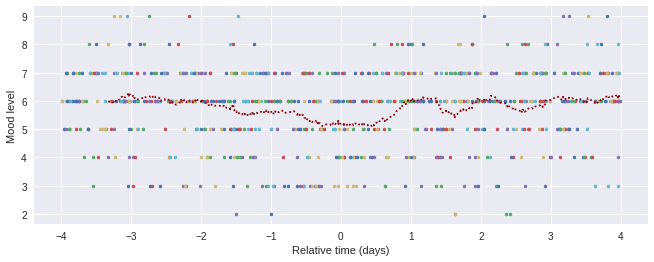Question: is my mood influenced by my weekly testosterone treatment?
Going forward, I’m going to focus my project on answering this question. Many transfolk report effects on behaviar/mood relative to the therapy cycle, but it’s hard to know how much of it is “real”, what the effects are, and whether I’m personally experiencing them.
I’m still interested in tracking other things that change with testosterone therapy, but that won’t be a focus. This project continues something I already started logging in the Quantified Self forums: tracking my transition with testosterone.
About this project log
I identify as non-binary (that’s like “trans” without committing to either gender  ). I’ve been female, and I want to become more physically male. So, in August last year I started taking testosterone.
). I’ve been female, and I want to become more physically male. So, in August last year I started taking testosterone.
When I made the decision to do this, I benefited greatly from reading and watching videos others had shared about their experiences with testosterone. So I thought it would be great if I could track what happened for me – to potentially benefit others facing the same decision.
What I’m tracking
I’m going to focus on mood tracking, and when I take my medication (a weekly injection; I try to shift the time backwards by 12 hours each week).
I’ll also continue trying to track other stuff that might be affected (vocal range, photos of my face, body measurements, grip strength).
What I learned so far
Losing the ability to cry
Almost immediately, the first thing I noticed was it was much harder to cry. I wrote about it in my first week update, and it’s remained this way.
In retrospect, I wish I’d been warned a bit better about this side effect. The clinic literature prepping folks for transition covers quite a lot of potential side effects, but potential behavior/emotion effects were about libido and aggression. I found losing the ability to cry much more dramatic.
Effects are idiosyncratic. But… losing the ability to cry is reported by many other transmen, and many transwomen report they gain the ability (lost since puberty, it seems). In retrospect, I miss it – not much, sometimes it’s nice – but overall I think it’s a loss.
Weekly emotional effects
A question I’ve been exploring is whether the weekly dose cycle affects my mood. Low testosterone is generally believed to cause negative emotions, and the half-life of testosterone cypionate is pretty short – 8 days. That means I’m at nearly 50% levels at the end of each week.
I’ve been using iMoodJournal since spring last year, so I wrote a Jupyter notebook to plot my mood scores relative to the timing of shots. (Also: I try to shift when I take shots so it’s not always the same day of the week.) It’s noisy, but with smoothing it does seem like there is a pattern. I remain wary of artifacts – so I’ll keep collecting data.

I’m surprised that the mood continues to be low after the shot – it’s as if the mood change doesn’t occur until 12 to 24 hours after treatment. (If my mood was simply “happier because I just did a treatment” I expect the effect would be more immediate?) I wonder if that’s how long absorption takes.
5 month update
I’ve increased dosage now to 60mg weekly – approaching where transmen tend to dose (to have the same levels as cismen). We might check serum testosterone levels after my next visit (in three months) to see what that looks like.
Vocal changes
My voice is definitely changing. I’ve been trying to track the high & low notes, and I think the lowest note I can reach has shifted down by a full note in the last month or so – from B2 to A2. In October and earlier I recorded C#3. The high notes are more confusing because my voice is breaking – sometimes I can hold it, sometimes I can’t – but it seems like the highest I can reliably reach has dropped dramatically (from G5 to C#5).
One thing I learned about is the “passaggio” – this is the classical music term for where my voice breaks – because it’s changing, my voice hits that transition point with a lot of difficulty. I can trigger it more easily by singing upwards (rather than downwards).

 The mood measurement is an interesting mechanism (swipe left/right for whether I’m nervous, happy, sad, etc.) but I’m not seeing a way to schedule regular check-in prompts.
The mood measurement is an interesting mechanism (swipe left/right for whether I’m nervous, happy, sad, etc.) but I’m not seeing a way to schedule regular check-in prompts. 
 )
)